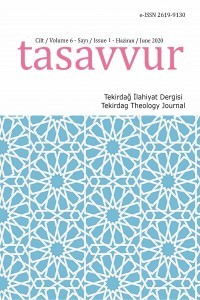İbn Miskeveyh’in Nefs Anlayışı
Bu çalışmanın amacı, İbn Miskeveyh’in nefs anlayışını genel hatlarıyla ortaya koymak, daha özelde ise duyusal ve akli idrak meselelerini incelemektir. O, nefs konusunu iki ana çizgide ele alır. Ahlâki ilkelerin temeli olarak nefs; duyusal ve akli idrakın öznesi olarak nefs. Bu iki alan bir birinden keskin hatlarla ayrılamaz ancak bu çalışmada nefs konusu, duyusal ve akli idrak problemleri esasında ele alınmıştır. İbn Miskeveyh, Meşşai filozofları takip ederek nefs kelimesini hem ayüstü âlem hem de ayaltı âlem için ortak kullanır. İbn Miskeveyh’in nefs teorisi, temelde Aristocu geleneğe dayanır. O, nefsi doğal cismin ilk yetkinliği olarak tanımlar. Nefs, hayat, canlılık ve ölümsüzlüğün ilkesidir. Varlık hiyerarşini madde değil nefs belirler. Bitki, hayvan ve insan için nefsin farklı yetileri vardır, ancak bu durum nefsin birliği ve bütünlüğüne tezat teşkil etmez. İnsan, bazı yetileriyle bitki ve hayvanlarla ortaktır ancak akıl yetisine sahip olmakla diğer canlılardan ayrılır. İnsanda, duyular, hayal ve vehim gücü hissi idrak mertebesinin aşamalarıdır. Akıl ise tümel akledilirleri idrak eder. Aklın birisi hissedilirlere diğeri akdedilirlere yönelik iki eğilimi vardır. Akıl ancak kendi zatına yönelerek yüce akdedilirleri kavrayabilir. Akdedilirleri elde edebilen insani nefs, bedenden bağımsız, kaynağı ilahi olan, ölümsüz bir cevherdir.
Ibn Miskawayh’s Concept of Nafs
The purpose of this study is to examine Ibn Miskawayh's concept of soul in general terms; more specifically, to analyze the sensory and intellectual perception problems. He deals with the soul in two main lines. The soul as the basis of moral principles; as the subject of sensual and intellectual perception. These two fields can not be separated by sharp lines, however, in this study, the soul concept is studied on the basis of sensory and intellectual problems. Ibn Miskawayh follows Peripatetic philosophers and uses the word ‘soul’ for both the terrestrial region and the celestial region, in the same sense. Ibn Miskawayh's theory of soul is basically based on the Aristotelian tradition. He defines the soul must be the first actuality of a naturally organised body. Soul is the basis of life, vitality and immortality. Soul determines the hierarchical chain of existence, not matter. The soul has different powers for plants, animals and humans, but this does not contrast with the unity and integrity of the soul. Man shares some faculty with plants and animals, but he is separated from other creatures by having intelligence. The sensation, imagination and fantasy are the stages of the material perception level, in man. The mind perceives universal forms. The mind has two tendencies; towards sensation and intelligible world. The mind can only perceives the supreme intelligible forms by turning to its own self. The human soul which is able to obtain intelligible forms and independent of the body is eternal essence and its source is divine.
___
- Aristoteles. Nikomakhos’a Etik. Çeviren Saffet Babür. Ankara: Kebikeç Yayınları, 2005.
- ———. Ruh Üzerine. Çeviren Zeki Özcan. İstanbul: Alfa Yayınları, 1999.
- Fârâbî. er-Risâle fi’l-akl. Tahkik: Maurice Bouyges. Beyrût: Daru’l-Meşrık, 1983.
- İbn Miskeveyh. el-Fevzü’l-asgâr. Tahkik: Salih Uzeyme. Tunus: Daru’l-Arabiyyeti’l-Kitâb, 1987.
- ———. el-Havami’l ve’ş-şevamil. Tahkik: Ahmet Emin, Seyyid Ahmed Şaqr. Frankfurt: Institute for The History of Arabic islamic Science At The Johann Wolfgang Goethe Universty, 2000.
- ———. Risale fî mâhiyyeti’l-adl. Editör M. S. Khan. Leiden: E. J. Brill, 1964.
- ———. “Risâle fi’n-nefs ve’l-akl”. Içinde Dirâsât ve nusûs fi’l-felsefe ve’l-ulûm inde’l-arab. Tahkik: Abdurrahman Bedevi. Beyrût: el-Müessesetü’l-Arabiyye, 1981.
- ———. Tehzîbü’l-ahlâk. Tahkik: Nevvaf Cerrah) Beyrût: Dar Sader, 2006.
- Ibn Miskeveyh. Textes inédits de Miskawayh. Editör Mohammed Arkoun. Le Caire: Institut français d’archéologie orientale, 1963.
- İbn Rüşd. Telhîs’u Kitâbi’n-Nefs. Tahkik: Alfred L.İvry. Kâhire, 1994.
- İbn Sînâ. eş-Şifâ, en-Nefs. Tahkik: G.C.Anawati-Said Zayid. Kâhire: el-Heyetü’l Mısriyyetü’l-Âmme li’l-Kitab, 1975.
- Kindî. “Fî’l-felsefeti’l-ûlâ”. Içinde Resâilu’l-felsefiyye. Tahkik: Abdulhâdi Ebû Rîde. Kâhire: Dâru’l-Fikri’l-Arabî, 1950.
- Kuçuradi, İonna. “Adalet Kavramı”. Içinde Adalet Kavramı, editör Adnan Güriz. Ankara: TFK Yayınları, 1994.
- LLoyd, G.E.R. Aristoteles. Çeviren Aylin Kayapalı. İstanbul: Pinhan Yayıncılık, 2014.
